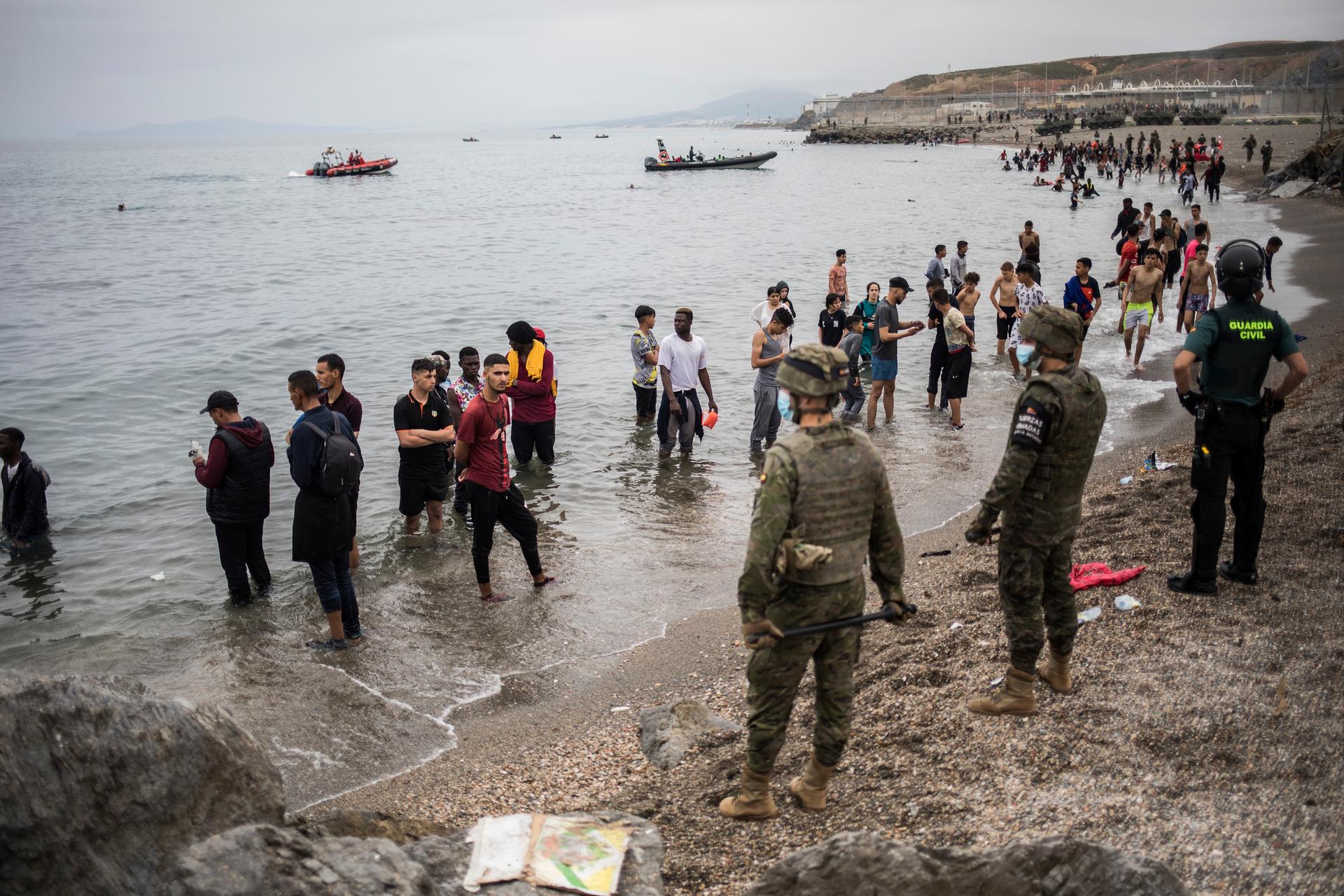Since Monday, more than 8,000 migrants have arrived on the beaches of the Spanish enclave of Ceuta.
It’s a Spanish port city on the northwestern tip of Morocco, not in Spain proper. Many of the migrants are arriving in Ceuta exhausted from swimming from neighboring Morocco. Others are getting to Ceuta on inflatable rafts. Many are children.
Related: Morocco’s ‘mule women’ risk death at Spanish border
The videos being shared online of their reception are stark. They show Spanish soldiers beating migrants and throwing them into the sea on the Moroccan border.
Jonathan Zaragoza-Cristiani follows migration from Morocco at the University of York. He talked with The World’s host Carol Hills about what’s happening between Morocco and Spanish Ceuta.
Related: Asylum-seekers in Greece await COVID-19 vaccine
Carol Hills: The location of Ceuta is important. Sketch a rough map of it for us, please.
Jonathan Zaragoza-Cristiani: So, Ceuta is a tiny Spanish enclave that sits on the northern shore of Morocco’s Mediterranean coast, and forms one of the European Union’s only land borders with, and in, Africa. It’s situated 250 miles further south. It’s actually a Spanish territory since the 15th century. Ceuta is coveted by Morocco. And actually, it has been, for a long time, a flashpoint in diplomatic relations between both countries.
How far are these migrants swimming to reach Ceuta?
They have to swim, more or less, a mile.
Now, Spain has sent troops, military trucks and helicopters to greet these migrants. Why are they arriving in Ceuta now?
What has most likely happened is that Morocco stopped cooperating for a few hours or days with Spain. And when all these migrants — sub-Saharans, or Moroccans and Algerians — knew about it, they took advantage of the situation, and they tried to enter.
Now, as I understand it, there’s a backstory here, a diplomatic dispute between Spain and Morocco, which may explain why Morocco eased up and let all sorts of migrants through. And that is that the leader of a rebel group that has fought for the independence of Western Sahara from Morocco, he’s receiving treatment in a hospital in Spain. What’s the evidence that the huge number of migrants arriving in Ceuta is related to that?
For 25 years, Morocco has instrumentalized migration. And every time Spain was not giving substantial compensation for the cooperation that Morocco was giving to Spain by controlling migrants, Morocco was, for a few days, hours, stopping to control the borders. And that’s when there was an unexpected inflow. These events with the Polisario Front leader most likely triggered this situation for Morocco. But, most likely, Spain stopped sending investments, sending aid for development, and this has been the last straw for Morocco. And with these 6,000-8,000 migrants, Morocco has tried to punish Spain for not cooperating enough with them.
You mentioned the Polisario Front, the rebel group that has been trying to win independence for Western Sahara. And so, the leader of the Polisario Front, I understand he’s suffering from COVID-19 and he’s in a hospital in Spain. Now, you think Morocco eased the way for migrants to move from Morocco into Ceuta? Is that opening now closed?
Yes, as soon as there was a big inflow like this one, Spain reacts very quickly. The two governments meet. Spain gives an important amount of money for Morocco to support them in cooperating on migration control. And, most likely, in the coming weeks, things are going to get calm. Or even in the coming days, I would say that no more big inflows are going to happen.
This interview has been edited and condensed for clarity.
We want to hear your feedback so we can keep improving our website, theworld.org. Please fill out this quick survey and let us know your thoughts (your answers will be anonymous). Thanks for your time!
